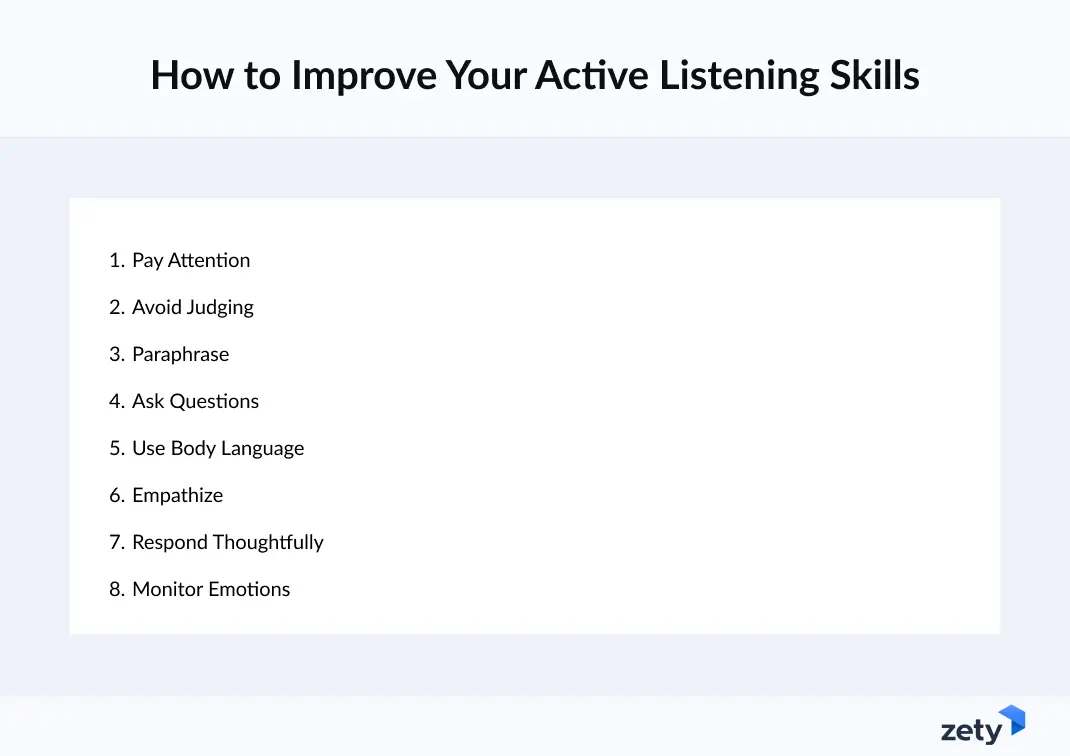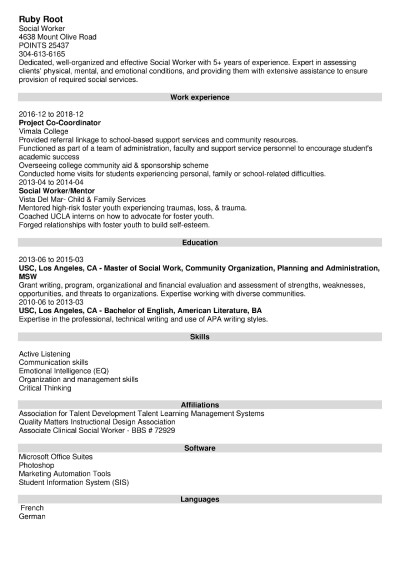How to Show Active Listening Skills on a Resume
Create Your Resume NowListen now: active listening is a great skill to have on a resume. It will help you convince the recruiter you’re a fast learner and a problem-solver. But how to put active listening skills on a resume? Read on, see some great examples, and even learn how to become a better listener!
This guide will show you:
- What is active listening and why are active listening skills important.
- How to improve active listening skills.
- Listening skills examples for a resume and beyond.
Want to save time and have your resume ready in 5 minutes? Try our resume builder. It’s fast and easy to use. Plus, you’ll get ready-made content to add with one click. See 20+ resume templates and create your resume here.
Sample resume made with our builder—See more resume examples here.
Looking for more great skills for your resume? Visit our guides:
- Administrative Skills
- Creative Thinking Skills
- Collaboration Skills
- Computer Skills
- Customer Service Skills
- Marketing Skills
- Management Skills
- Organizational Skills
- Problem-Solving Skills
- Time-Management Skills
What is Active Listening?
We think listening comes naturally, but actually, that’s listening, and not hearing. And there’s a great difference between these two. Hearing is simply receiving sound while listening requires an active effort to understand it.
Active listening means truly hearing what someone says in order to understand their thoughts and feelings. It creates a balanced, two-way conversation. In other words, active listening means making an effort to truly listen, trying to understand not just the speaker's words but also their emotions.
So why is active listening important?
Active listening skills are key skills in many jobs. They allow you to learn quickly, and therefore, they boost your productivity. When employers mention listening skills in job ads, they want to know if you can use effective communication to meet job expectations. They are looking for someone with great interpersonal skills and outstanding people skills. Active listening is often listed among leadership skills.
This valuable skill also makes people around you feel comfortable, leading to extensive and new collaborations. Your increased understanding, as an active listener, will make it easier for you to identify and solve problems.
As you can clearly see, it’s good to be able to listen actively. The good news is: there’s actually a way to become a better listener.
Pro Tip: Some employers look for “attentive candidates.”To be attentive means listening without distraction, which involves setting aside your own goals and arguments and fully focusing on the speaker. This skill is key to professional interactions and successful outcomes.
How to Become an Active Listener
What’s the biggest difference between hard and soft skills? Hard skills can be traditionally taught. Soft skills, on the other hand, are something you gain through your life. But you can also train yourself to acquire them or to become better at them. The same goes for improving your listening skills.
Here are some simple tips to follow to become a better listener:
- Pay Attention and focus on the speaker without distractions.
- Avoid Judging and don’t interrupt or assess right vs. wrong.
- Paraphrase by reflecting key points back to ensure you completely understand everything.
- Ask Questions, especially open-ended ones, to clarify any doubts.
- Use Body Language: nod, smile, and maintain eye contact naturally.
- Empathize by validating their emotions and acknowledging their feelings.
- Respond Thoughtfully and share your view only after confirming full understanding.
- Monitor Emotions and slow the conversation if emotions run high to avoid tuning out and unnecessarily heating the discussion.
Okay, now that we know what active listening is and how to become great at it, there’s one more question to answer: How can you prove it to your recruiter straight on your resume?
 Before jumping in on that, see all there is to know about writing a great resume: How To Write a Resume
Before jumping in on that, see all there is to know about writing a great resume: How To Write a Resume
Making a resume with our builder is incredibly simple. Follow our step-by-step guide, use ready-made content tailored to your job and have a resume ready in minutes.
When you’re done, Zety’s resume builder will score your resume and our resume checker will tell you exactly how to make it better.
20 Active Listening Skills Examples for Resumes
Listen: listing active listening skills on your resume won’t work by itself. You need to back it up with your relevant achievements. And there’s no better way to do it than in your work experience section.
Let’s see some great examples of how you can do it well:
Active Listening Skills Examples for Accountant Resumes
- Applied active listening with clients to better understand their financial goals, helping reduce tax liabilities by 15%.
- Used attentive listening to resolve discrepancies, cutting down audit time by 20%.
Read more: Accountant Resume
Listening Skills on a Resume for an Architect
- Engaged in active listening with clients to clarify design preferences, resulting in a 98% client approval rate for final drafts.
- Used active listening to understand contractors’ concerns, which helped reduce project delays by 10%.
Read more: Architect Resume
Examples of Listening Skills on a Resume for Students
- Practiced active listening during group projects, leading to improved collaboration and a 5% increase in project grades.
- Used attentive listening in class discussions, resulting in a 20% higher participation rate and deeper engagement in subjects.
Read more: Student Resume
Examples of Active Listening Skills for Managers
- Used active listening with team members to address concerns, boosting employee satisfaction by 25%.
- Employed listening skills to gather feedback, helping improve team productivity by 15%.
Read more: Manager Resume
Active Listening Skills on a Resume for a Warehouse Worker
- Applied active listening with supervisors to quickly learn safety protocols, leading to a 10% decrease in accidents.
- Used attentive listening to understand customer order details, reducing shipping errors by 12%.
Read more: Accountant Resume
Examples of Good Listening Skills for a Copywriter
- Used active listening during client briefings to better understand needs, increasing client satisfaction by 20%.
- Actively listened to feedback, improving content accuracy and reducing revision time by 30%.
Read more: Copywriter Resume
Listening Skills on a Resume for a Teacher
- Applied active listening with students to identify learning challenges, leading to a 10% improvement in overall class performance.
- Used listening skills during parent-teacher conferences, improving parent satisfaction by 15%.
Read more: Teacher Resume
Listening Skills Examples for a Civil Engineer
- Used active listening with stakeholders to understand project expectations, reducing scope changes by 18%.
- Applied attentive listening with team members to solve on-site issues, cutting delays by 20%.
Read more: Civil Engineer Resume
Active Listening Skills Examples for Bartenders
- Actively listened to customer preferences, leading to a 10% increase in repeat business.
- Used listening skills to resolve conflicts with patrons, improving overall bar satisfaction by 12%.
Read more: Bartender Resume
Listening Skills on a Resume for Event Managers
- Used active listening with clients to tailor events to their needs, achieving a 98% client satisfaction rate.
- Applied listening techniques to vendor negotiations, reducing event costs by 15%.
Read more: Event Manager Resume
Active Listening Skills on a Resume for a Graphic Designer
- Applied active listening in client meetings, resulting in 25+ projects delivered with 95% client approval on the first draft.
- Used listening skills to identify brand needs, improving design consistency and increasing customer engagement by 18%.
Read more: Graphic Designer Resume
Listening Skills Examples for Certified Nursing Assistants (CNA)
- Employed active listening with patients to understand their needs, increasing patient satisfaction scores by 20%.
- Used attentive listening during patient care, reducing reported issues by 15%.
Read more: Certified Nursing Assistant (CNA)
Active Listening Skills for a Resume for Cashier Jobs
- Used active listening with customers to solve their concerns, resulting in a 10% increase in positive feedback.
- Applied listening skills to speed up transactions, reducing wait times by 12%.
Read more: Cashier Resume
Listening Skills Examples for a Data Entry Specialist
- Employed active listening in team meetings to better understand data accuracy goals, reducing input errors by 25%.
- Used attentive listening to follow detailed instructions, increasing efficiency by 15%.
Read more: Data Entry Resume
Examples of Listening Skills for an Artist
- Actively listened to client feedback, delivering 95% of commissioned pieces with no revisions.
- Used listening skills in collaboration with galleries, leading to a 20% increase in exhibition success.
Read more: Artist Resume
Examples of Active Listening Skills for a Secretary
- Used active listening to manage multiple phone lines, improving response time by 20%.
- Applied listening skills to address office concerns, helping streamline processes and reduce errors by 15%.
Read more: Secretary Resume
Listening Skills Examples on a Resume for an Executive Assistant
- Employed active listening with executives to prioritize tasks, saving 10 hours a week in scheduling conflicts.
- Used listening skills to resolve communication issues between departments, reducing miscommunication by 30%.
Read more: Executive Assistant Resume
Listening Skills Examples for Office Manager Jobs
- Applied active listening with staff to identify office inefficiencies, reducing operational costs by 15%.
- Used listening techniques to address employee concerns, improving morale by 20%.
Read more: Office Manager Resume
Active Listening Skills for a Resume for Sales Managers
- Used active listening with clients to tailor sales pitches, leading to a 25% increase in closing rates.
- Applied listening skills with team members, improving coaching sessions and increasing team sales by 18%.
Read more: Sales Manager Resume
Examples of Listening Skills for HR Assistants
- Employed active listening with candidates during interviews, improving new hire satisfaction by 15%.
- Used listening skills to resolve employee conflicts, reducing complaints by 10%.
Read more: HR Assistant Resume
As you can see, there are great ways of showing your active listening skills on a job-winning resume. Just remember to list only your most relevant achievements and to do it in bullet points. And don’t forget to quantify: numbers pop, and it’s easier to catch your recruiters' attention with them!
Active listening is important, but let’s not forget about other important skills. We’ve analyzed over 11 million resumes created in Zety, and we know that these are the top 10 most popular ones:
- Analytical and Critical Thinking
- Attention to Detail
- Data Entry
- Excellent Communication
- MS Office
- Multitasking
- Problem-solving
- Project Management
- Team Management
- Teamwork and Collaboration
Plus, a great cover letter that matches your resume will give you an advantage over other candidates. You can write it in our cover letter builder here. Here's what it may look like:
See more cover letter templates and start writing.
Key Takeaway
Here’s a recap of active listening skills:
- Active listening is paying attention to the message, not just the words.
- Repeat the message back to the speaker to build understanding on both sides.
- To list effective listening on a resume, show how your skills helped the company.
- To improve active listening skills, read books or take an online class. This guide includes links to several good ones.
Want to be a better listener? Need more active listening exercises? Comment below, and I’ll be happy to reply.
About Zety’s Editorial Process
This article has been reviewed by our editorial team to make sure it follows Zety's editorial guidelines. We’re committed to sharing our expertise and giving you trustworthy career advice tailored to your needs. High-quality content is what brings over 40 million readers to our site every year. But we don't stop there. Our team conducts original research to understand the job market better, and we pride ourselves on being quoted by top universities and prime media outlets from around the world.




